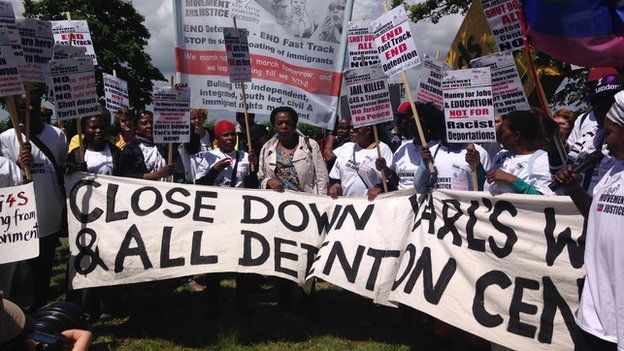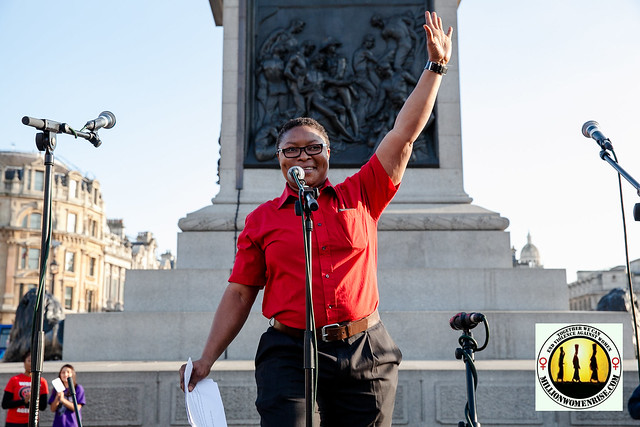
Another week, another `discovery’ that the liberal democratic State is in the business of torturing women asylum seekers. This week’s offering, Report on an unannounced inspection of Yarl’s Wood Immigration Removal Centre by HM Chief Inspector of Prisons, opens: “Yarl’s Wood immigration removal centre in Bedfordshire held 354 detainees at the time of this inspection. Most of those held were single women … The centre has been controversial since it opened in 2001 and in recent months it has been the subject of new allegations about the treatment of women held there and the conduct of staff. We last inspected the centre in June 2013 … This inspection found that in some important areas the treatment and conditions of those held at the centre had deteriorated significantly, the main concerns we had in 2013 had not been resolved and there was greater evidence of the distress caused to vulnerable women by their detention.” Yarl’s Wood has always been bad, and now it’s `deteriorated.’
The Chief Inspector concludes, “Yarl’s Wood is rightly a place of national concern … Yarl’s Wood is failing to meet the needs of the most vulnerable women held … We have raised many of the concerns in this report before. Pregnant detainees and women with mental health problems should only be held in the most exceptional circumstances. Rule 35 processes are meant to protect people from detention when they have been tortured and traumatised or are extremely vulnerable in other ways. Staff should have the training and support they need to better understand the experiences of the women for whom they are responsible. There are not enough female staff. This inspection has also identified new concerns. Health care needs to improve urgently. Staffing levels as a whole are just too low to meet the needs of the population. Yarl’s Wood has deteriorated since our last inspection and the needs of the women held have grown. In my view, decisive action is needed to ensure women are only detained as a last resort. Procedures to ensure the most vulnerable women are never detained should be strengthened and managers held accountable for ensuring they are applied consistently. Depriving anyone of their liberty should be an exceptional and serious step. Other well-respected bodies have recently called for time limits on administrative detention. In my view, the rigorously evidenced concerns we have identified in this inspection provide strong support for these calls, and a strict time limit must now be introduced on the length of time that anyone can be administratively detained.”
None of this is new; we have raised many of the concerns before. One by one by one, women tell their stories of life, and death, inside Yarl’s Wood, and, after a momentary shuffle, Yarl’s Wood remains. A year ago today, in response to the abuse rained upon Nigerian lesbian, feminist, asylum seeker Aderonke Apata, we wrote, “End the United Kingdom’s current witch-hunt against African lesbians, against African women asylum seekers, against African women generally. Shut down Yarl’s Wood. Don’t delay, don’t pretend it’s complicated. It’s not. The `conditions in there are very bad.’ Every day Yarl’s Wood is open, women living trauma are forced to engage with their past traumas wrapped into new ones, with the pain intensifying by the second. Every day Yarl’s Wood is open, women who sought help are exploited and then exploited again more intensively. It’s not complicated. Shut down Yarl’s Wood, because it’s bad and wrong, and every day it’s open, we are steeped deeper and deeper into guilt and shame. All of us are. Shut down Yarl’s Wood. Do it today.”
365 days later, the protest numbers grow, and Yarl’s Wood stands, solid as ever.
Yarl’s Wood is part of the global economy of miserable efficiencies, in which women who seek haven are criminalized and then forced to pay for “the troubles” they have caused. From fast track in the UK to rocket dockets in the USA, time is money. The assembly line of rejected women, and children, asylum seekers, overwhelmingly racially and ethnically identified, must continually accelerate. No time for health care. These women can’t afford that, anyway. No time to hire adequate staff. These women can’t afford to pay for proper staff. Why are women seeking asylum put in prison? Because these women can’t afford to live here. That’s the law.
(Photo Credit: Sally Hayden / VICE News)

_LRG.jpg)






